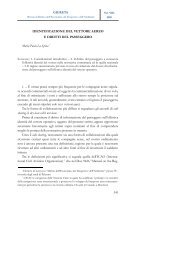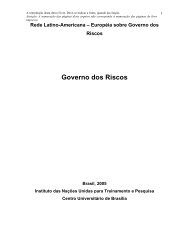YEARS OF EUROPEAN ONLINE ANNÉES DE EN LIGNE ...
YEARS OF EUROPEAN ONLINE ANNÉES DE EN LIGNE ...
YEARS OF EUROPEAN ONLINE ANNÉES DE EN LIGNE ...
You also want an ePaper? Increase the reach of your titles
YUMPU automatically turns print PDFs into web optimized ePapers that Google loves.
this checkpoint is given a Priority 1, which<br />
means that:<br />
‘(Priority 1)<br />
A web content developer must satisfy this<br />
checkpoint. Otherwise, one or more<br />
groups will ind it impossible to access information<br />
in the document. Satisfying this<br />
checkpoint is a basic requirement for<br />
some groups to be able to use web documents.’<br />
[http://www.w3.org/tR/wAI-wEBCONt<strong>EN</strong>ttEChS/#tech-simple-and-straightforward]<br />
this is the standard in Germany, for example,<br />
for the websites of federal authorities.<br />
the regulator laid down the following<br />
in the annex to the BITV (Verordnung zur<br />
Schaffung barrierefreier Informationstechnik nach<br />
dem Behindertengleichstellungsgesetz — Order<br />
on the creation of accessible It in accordance<br />
with the Equal treatment (Disability)<br />
Act):<br />
‘the requirements and conditions in this<br />
Annex are based, in principle, on the web<br />
Content Accessibility Guidelines 1.0 of<br />
the world wide web Consortium of 5<br />
may 1999.’<br />
[http://www.gesetze-im-internet.de/bitv/<br />
BJNR265400002.html]<br />
As the federal ministry of Justice publishes<br />
federal law on the Internet, it is therefore responsible,<br />
as the web content developer, for<br />
ensuring that the language used in the laws<br />
published there is clear and simple.<br />
But is this a real problem? when it comes to<br />
today’s EU law, is the problem of incomprehensibility<br />
really so serious that it constitutes<br />
a signiicant barrier to access?<br />
At this point — and to complement your<br />
own experience in this matter — I would<br />
like to call as my star witness the former<br />
Swiss Chancellor, Annemarie huber-hotz.<br />
She said the following on this subject in<br />
2000:<br />
‘the greatest challenge in terms of intelligibility<br />
of our laws is currently, without<br />
doubt, EU law, which we have been “independently<br />
shadowing” for a long time<br />
now and, with the advent of bilateral<br />
agreements, directly applying in some<br />
cases. Don’t get me wrong: I am a convinced<br />
European, but, in my view, we<br />
should not just sit back and accept as a<br />
given the sometimes absurdly complicated,<br />
intricate and incomprehensible nature<br />
of some EU laws. As an example, let me<br />
give you only the title of an EU regulation.<br />
I realise that I am expecting a lot of you …<br />
the title is:<br />
“Commission Regulation (EC) No<br />
2592/1999 of 8 December 1999 amending<br />
Regulation (EC) No 1826/1999 amending<br />
Regulation (EC) No 929/1999 imposing<br />
provisional anti-dumping and countervailing<br />
duties on imports of farmed Atlantic<br />
salmon originating in Norway with regard<br />
to certain exporters, imposing provisional<br />
anti-dumping and countervailing duties<br />
on imports of such salmon with regard to<br />
certain exporters, amending Decision<br />
97/634/EC accepting undertakings offered<br />
in connection with the anti-dumping and<br />
anti-subsidies proceedings concerning imports<br />
of such salmon and amending<br />
Council Regulation (EC) No 772/1999 imposing<br />
deinitive anti-dumping and countervailing<br />
duties on imports of such salmon<br />
(Official Journal of the European Communities<br />
L 315, 9.12.1999, p. 17.”’<br />
[Annemarie huber-hotz, Recht haben — gerecht sein<br />
(http://web.archive.org/web/20030701101153/<br />
http://www.admin.ch/ch/d/bk/hu20001106.htm)]<br />
So far, so good — or so bad. however, and<br />
by way of a brief digression, the existence of<br />
possibly incomprehensible EU regulations<br />
prompts an interesting question concerning<br />
EU law. Can an incomprehensible Community<br />
regulation be transposed into national<br />
law so as to be understood, even though it<br />
already applies (but is possibly incomprehensible)<br />
without being transposed?<br />
the Commission, in a recommendation addressed<br />
to Denmark in 1973, considered this<br />
possible:<br />
‘Under Article 189 of the treaty, those<br />
regulations are directly applicable in<br />
member States and entered into force in<br />
Denmark on 1 January 1973. there is<br />
therefore no need to incorporate their provisions<br />
in national instruments. this could<br />
01_2007_5222_txt_ML.indd 40 6-12-2007 15:13:20



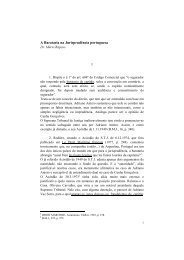
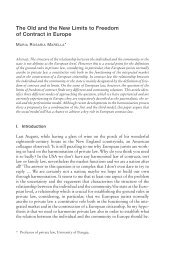

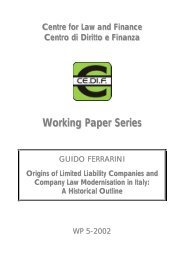
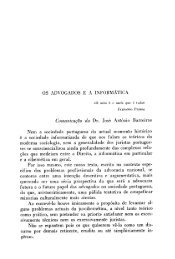
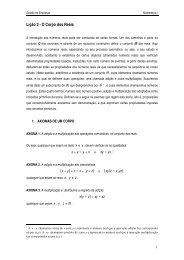

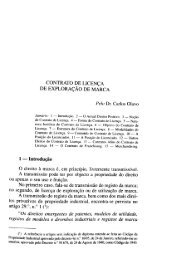
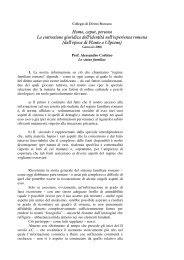
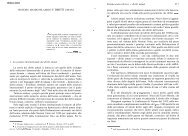

![Luigi Sapio Nozione di islām La parola “islām” [ ] è il mas.dar1 ...](https://img.yumpu.com/15836073/1/185x260/luigi-sapio-nozione-di-islam-la-parola-islam-e-il-masdar1-.jpg?quality=85)
